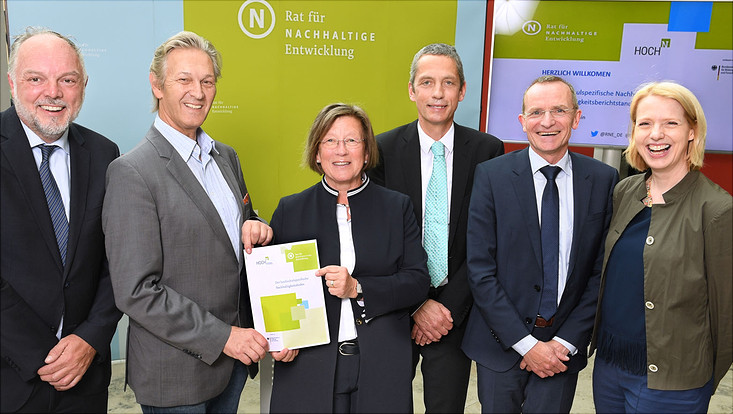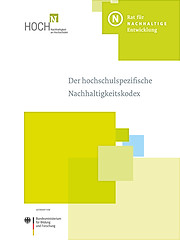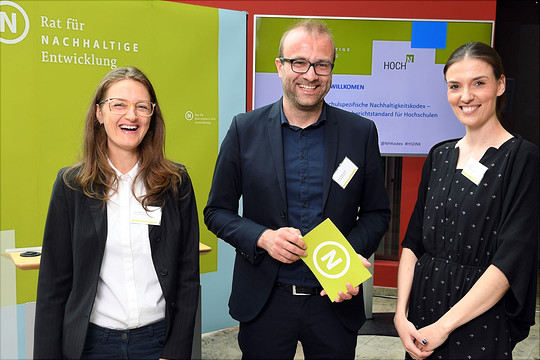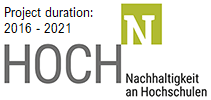
German Sustainability Code for Higher Education Institutions presented
16 May 2018

Photo: David Ausserhofer@Rat für nachhaltige Entwicklung
On May 15, 2018, the members of the field of action "Sustainability Reporting" in the the Federal Ministry of Education and Research (BMBF)-funded project "Sustainability at Universities: Developing - Networking - Reporting (HOCH-N)" together with the German Council for Sustainable Development (RNE) presented the adopted university-specific sustainability code, in short HS-DNK, at the GIZ-Haus in front of almost 100 university representatives in Berlin.
With this milestone in the HOCH-N project, a low-threshold entry into uniform sustainability reporting for universities in Germany is now available for the first time. On the basis of 20 criteria from the areas of strategy / process management: governance / environment: operations / society, universities can now focus on the essentials.
Marlehn Thieme, chair of the Council for Sustainable Development, welcomed the participants and was pleased that they represent more than 40 universities - after all, ten percent of all german universities. Especially universities are important drivers for the transformation towards sustainable development. Like the economy, politics and society, they face the challenge of transforming sustainable development into their own structures.
Florian Frank from the department "Fundamental Issues Sustainability, Climate, Energy" (BMBF) emphasized in his keynote address that sustainability management is based on collaborative cooperation within the university. The Code helps universities, but does not constitute a final point. It requires more application, testing, and adaptation.
Prof. Dr. Jetta Frost, Vice President of the Universität Hamburg, outlined a perspective for universities on the sustainability path. On the basis of three theses, in which she played with the image of a map, she made it clear: "the map is not the territory". The concept of sustainability is not too narrow to define, must allow ambiguity and room for interpretation without however becoming interchangeable (thesis: "Sustainability is a floating signifier"). She also pointed out that universities are places of "intellectual risk taking" and thus are not subject to classical usage criteria (thesis: "Do not reduce the quality of coverage to quantitative factors"). In order not to be in danger of solving only self-defined problems, cognitive maps can be used as navigational instruments for unknown terrain (thesis: "Working on Sustainable Challenges requires many maps").
Prof. Dr. Gerhard de Haan, Freie Universität Berlin and Prof. Dr. André Niemann, University of Duisburg-Essen, as heads of the HOCH-N group on "Sustainability Reporting", reflected the process of developing as well as the testing of the standard within HOCH-N. de Haan encouraged the university representatives present to get involved in the reporting process. Niemann referred to the easier entry, which the HS-DNK offers and emphasized that students can be more intensively involved as networking partners.
Prof. Dr. Alexander Bassen, project manager HOCH-N and also head of the work package Sustainability Reporting at the Universität Hamburg presented the criteria in detail. Especially in the area of the environment it becomes clear that the criteria have to be handled individually. If, for example, real estate does not belong to the university, the sphere of influence is limited. Bassen announced that a guide with more detailed explanations and practical examples will be developed for the present catalog. This should be available in the summer of 2018.
In a fishbowl format first-time users discussed their experiences, including the student Laura Schüler, who prepared the Sustainability Report of the University of Bayreuth with the oikos student initiative, Andreas Wanke, Head of the Sustainability and Energy Unit at the Freie Universität Berlin and Prof. Dr. Klaus Helling from the Environmental Campus Birkenfeld of the University of Trier.

The further research team of the HOCH-N research area Sustainability Reporting: Coco Klußmann (FU Berlin), PD Dr. Remmer Sassen (Uni Hamburg) and Elisa Gansel (Uni Duisburg-Essen), Foto: David Ausserhofer@Rat für Nachhaltige Entwicklung
Title, left to right: Prof. Dr. André Niemann, Prof. Dr. Gerhard de Haan, Marlehn Thieme, RD Florian Frank, Prof. Dr. Alexander Bassen, Prof. Dr. Jetta Frost
The Sustainability Code for Higher Education Institutions (german)
The Sustainability Code for Higher Education Institutions (english)
